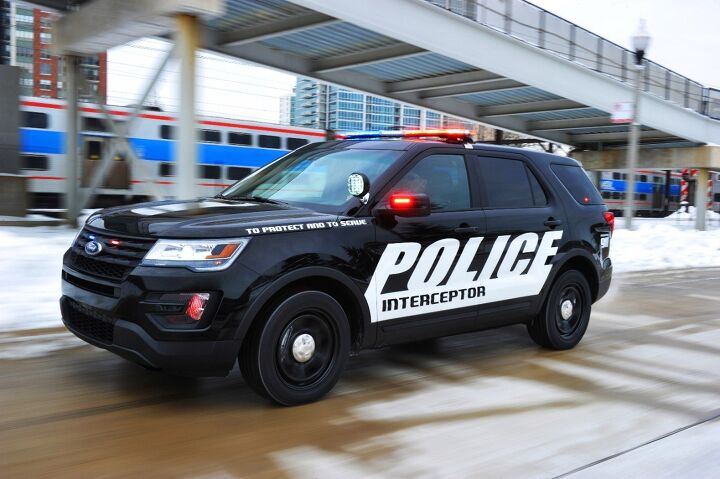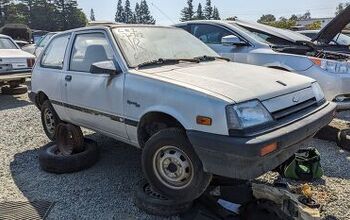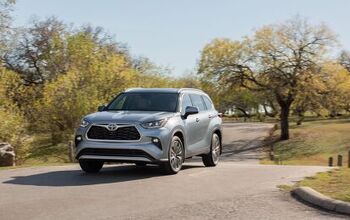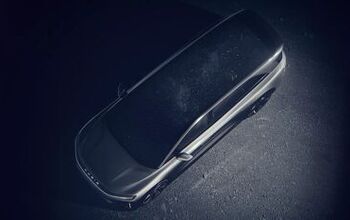SUVs Likely to Become Dominant Police Vehicle, 'Bigger' Cops Rejoice

North America’s romantic entanglement with the sport utility vehicle is not limited to retail consumers, as police fleets in the United States and Canada have been getting in on the action for a while now. Valuing durability and flexibility above all else, law enforcement’s gradual shift toward SUVs seems to have been inevitable.
Ford said that sales of its Explorer-based Interceptor Utility surpassed its Taurus-based Interceptor Sedan in 2014, claiming that the SUV had “officially” become North America’s most popular police vehicle. While that might not be entirely accurate until current fleets retire the horde of large sedans that proved so popular in the past, the utility trend is growing and departments have plenty of praise for them — especially departments rife with oversized officers.
“We’re all dealing with the same issue, and that is the vehicles are getting smaller, yet there’s still demand for more gadgets and equipment put into those cars,” Julie Furlotte, the Royal Canadian Mounted Police’s national mobile assets manager, told Automotive News. “It’s always a bit of a tradeoff and a challenge to make it all fit.”
When Ford retired the Crown Victoria P7B Interceptor, its replacement was praised for superior performance and versatility but universally loathed for its less spacious interior. This week, South Carolina’s Greenville PD gave those very reasons for why it decided to swap out its entire fleet to sport utility vehicles.
“We’re trying to make sure we have a fleet that serves many purposes. Having all-wheel-drive vehicles will help during bad weather, we’ll be able to respond to calls more quickly,” Officer Gilberto Franco told WYFF 4. “For officers who are very tall or just bigger in size, they were having a difficult time trying to get in and out of the vehicle.”
While it’s easy to scoff at chubby cops and make jokes about staying away from the donut shop, interior comfort and space are incredibly important when considering a vehicle that doubles as your office — even more so when you are big-boned.
“The larger the guy, the harder it is to get into a smaller car,” said Sgt. Michael McCarthy of the Michigan State Police’s precision-driving team. “The SUVs are up higher, they’re easier to get in and out of. I love driving the sedans as long as I can stay in them but if I have to get in and out of them all day I much prefer a taller vehicle.”
Every year, the Michigan State Police tests all available pursuit vehicles, and those evaluations become the deciding factor for many departments’ purchases. McCarthy says that, in recent years, the performance differences between police sedans and SUV has become much less noticeable.
“LAPD are buying a larger percentage of SUVs than they are of the sedans,” McCarthy said. “They are very capable. They have a fairly short turning radius. They’re deceptively fast.”
Ease of entry and egress for husky or hulking officers isn’t the sole benefit, however. Durability plays a massive factor for fleet vehicles in general and is another reason the Crown Victoria was the darling of so many police departments and cab companies.
Fred Dixon, GM Canada’s manager of fleet marketing and sales, told Automotive News that the body-on-frame design of the Chevrolet Tahoe has kept repair costs down.
“I’m hearing from my customers anyway that when they look at the sedan versus the SUVs, the SUVs are a little bit more expensive (but) they actually get better durability out of them,” Dixon explained.
Meanwhile, Ford’s Interceptor Utility shares many parts with the Interceptor Sedan, reducing maintenance expenses and making it easier to rationalize adding them to a fleet already brimming with spare components. The Blue Oval also had the foresight to design the SUV as a pursuit-rated vehicle — bullet-resistant armor and all.
Those factors helped Ford quickly retake a dominant share — over 61 percent — of the police fleet market in 2015.
Introduced in 2012, the Police Interceptor Utility only needed a couple of years to become America’s best-selling police vehicle. By 2014, Ford starting selling roughly 25 percent more Interceptor SUVs than it does the already popular Interceptor sedan.
Cops want utility vehicles, and all available data points to a future where —outside of major urban centers — SUVs are the most common squad car on the road.
[Image: Ford Motor Company]

A staunch consumer advocate tracking industry trends and regulation. Before joining TTAC, Matt spent a decade working for marketing and research firms based in NYC. Clients included several of the world’s largest automakers, global tire brands, and aftermarket part suppliers. Dissatisfied with the corporate world and resentful of having to wear suits everyday, he pivoted to writing about cars. Since then, that man has become an ardent supporter of the right-to-repair movement, been interviewed on the auto industry by national radio broadcasts, driven more rental cars than anyone ever should, participated in amateur rallying events, and received the requisite minimum training as sanctioned by the SCCA. Handy with a wrench, Matt grew up surrounded by Detroit auto workers and managed to get a pizza delivery job before he was legally eligible. He later found himself driving box trucks through Manhattan, guaranteeing future sympathy for actual truckers. He continues to conduct research pertaining to the automotive sector as an independent contractor and has since moved back to his native Michigan, closer to where the cars are born. A contrarian, Matt claims to prefer understeer — stating that front and all-wheel drive vehicles cater best to his driving style.
More by Matt Posky
Latest Car Reviews
Read moreLatest Product Reviews
Read moreRecent Comments
- IBx1 Everyone in the working class (if you’re not in the obscenely wealthy capital class and you perform work for money you’re working class) should unionize.
- Jrhurren Legend
- Ltcmgm78 Imagine the feeling of fulfillment he must have when he looks upon all the improvements to the Corvette over time!
- ToolGuy "The car is the eye in my head and I have never spared money on it, no less, it is not new and is over 30 years old."• Translation please?(Theories: written by AI; written by an engineer lol)
- Ltcmgm78 It depends on whether or not the union is a help or a hindrance to the manufacturer and workers. A union isn't needed if the manufacturer takes care of its workers.


































Comments
Join the conversation
So what they really needed was a minivan. Ideally the rental-grade Sienna with the 2.7L I4. Jack called this one years ago. Cops liked the CV because it had a long hood. They liked the Charger because it had a crosshair on the grille. They like the Explorer because it rides high and has an imposing visage in interceptor trim. I don't doubt it's a pain to get into a modern sedan with a vest and a belt, but if the answer to that is a Tahoe or an Explorer, then this is first and foremost about the paramilitary theater of modern policing.
The most common police vehicle in the Dallas suburbs is the Chevrolet Tahoe. Black and white, slightly lowered, steel wheels, and 2WD. Not many Crown Vics were replaced by Tauruses.